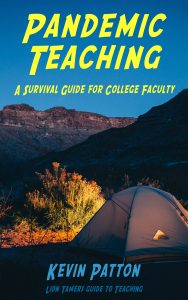I'm happy to announce the availability of a new professional development book, which is the first in a series called—you guessed it—Lion Tamers Guide to Teaching. This new book is called Pandemic Teaching: A Survival Guide for College Faculty and is available in most channels for download at no cost.
As teaching faculty across the globe scramble to move their on-campus courses to a remote-learning format, as a veteran teaching mentor, I'm using the new book to provide a quick and dirty survival guide to get things started—and keep things going. Having had the experience of moving from on-campus to online teaching, I leverage my failures and triumphs into a quick guide to what's important and what's not as you make your transition in this crazy time of pandemic teaching.
The first section of the book provides a list of quick tips, strategies, and helpful mindsets—all based on my real-life practical experience based on evidence-based strategies. The second part of the book expands on some of those quick tips to give further advice for implementing them.
Written in an informal, conversational style, this book gives useful advice and empathetic support as you survive your own experience of pandemic teaching.
Pandemic Teaching: A Survival Guide for College Faculty is an eBook and downloadable from several channels, with more being added as the book roll-out continues. It's a short, approximately 2-hour read—so not a burden to get through during this hectic time for all of us. It's not discipline-specific, either, so please share it with your colleagues and with your institutions' teaching support center. Although written for "college faculty" it is just as useful for K-12 teachers, I think.
In the book, I describe Lion Tamers Guide to Teaching as a collection of resources for teachers to improve teaching effectiveness as well as rapport with students. As I've said for years, “all I really need to know about teaching I learned as a lion tamer,” because my early experience as a wild animal trainer and apprentice lion tamer taught me not only the core principles of learning science—it taught me how to gain the trust of students and form the kind of empathetic and compassionate bond that promotes learning.
The more of us who can share it using the link https://books2read.com/u/3RN7Yn the more faculty will have access to the help it provides. I'm asking you each to please share the link with FIVE colleagues!
Showing posts with label professional development. Show all posts
Showing posts with label professional development. Show all posts
Monday, April 13, 2020
Saturday, October 15, 2011
Old lion tamers
 | |
| Jules Jacot, St.Louis Zoo |
Of course, she's right. Neuroscientists continue to demonstrate that our brains do indeed become much more capable of insight, wisdom, and problem solving as we age. This train of thought got me thinking about old lion tamers. Really, I swear to it!
Sometimes people ask me who the best lion tamer is or was. Although in my mind there are several close contenders, my immediate response is always Jules Jacot
Whenever other animal trainers find out that I grew up in St. Louis, they asked me if I knew Jules Jacot. Although he never became famous to the public, he was very well known and respected among circus people and zoo people.
When I first began working with big cats, I noticed that most of the new acts were being put together by elderly lion tamers, most of whom did not perform in public anymore. Jules Jacot had just put together a new act shortly before he died (in his sleep) at age 81.
At first I wondered why it was the older trainers, rather than the younger and presumably more energetic trainers, that were being hired for these challenging jobs training new groups of lions and tigers. It's one thing to present an existing act but quite another to quickly put a new act together with young, untrained wild animals.
Eventually, I came to realize that the older trainers were so good at training cats that they could put a really good act together in a much shorter time than a younger trainer could. Of course! These older men and women had experimented over a lifetime and their experience allowed them to apply their distilled wisdom to each new training assignment.
I soon learned that if I wanted to become a successful wild animal trainer, I needed to seek out the wisdom of these experienced trainers. A few of them have written books that contain the fruit of their experience. I read and reread as many of these books as I could. I sought older trainers and asked them to tell me stories about how they do what they do.
When they offered to let me watch them train and practice and perform, I jumped at the chance! It was amazing to me how quickly each of them could read their animals and use that information to train them quickly, efficiently, and with very little stress to the animal or the trainer.
I think this is a good lesson for us as educators. Teachers who have spent a lifetime experimenting with different approaches and techniques, teachers who have seen hundreds or even thousands of unique students over their careers, can be a wealth of information and insight for beginning teachers. For all of us.
In my modest experience, I have seen some new teachers quickly blossom into effective teachers and others not fare quite so well. And most often, the difference is whether they invested time and effort into reading and watching the "old masters" at work.
No matter where we are in our teaching careers, I think we can benefit from sitting in on a class or two taught by an experienced colleague.
Here's a good place to start . . . What the Best College Teachers Do
Subscribe to:
Posts (Atom)


